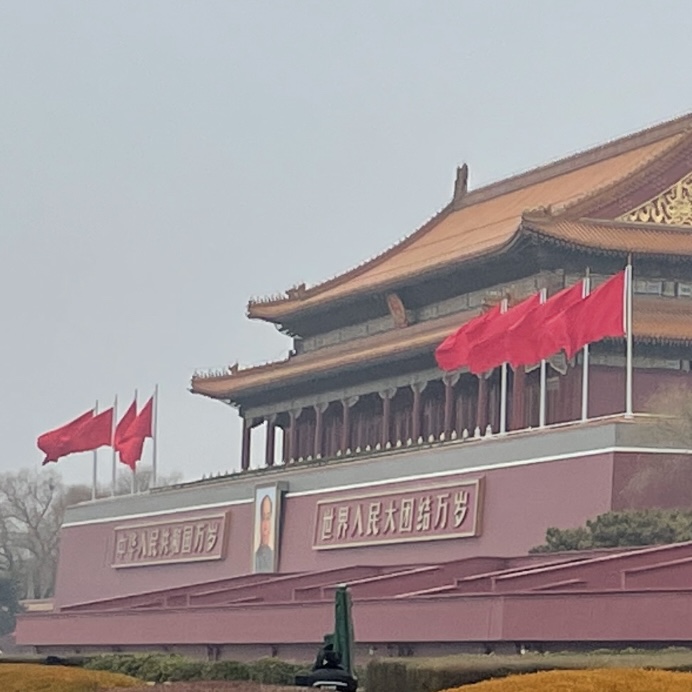- 4 Posts
- 18 Comments

 30·8 months ago
30·8 months agoRelated, China has become the number one scientific destination with the largest inflow of researchers outstripping the US, according to OECD data as reported (archive) by Science Business. I can’t cite the OECD data since it seems to be behind a paywall, but I believe you can find it here.
China also leads the world with nearly half of all applications for international patents (46.8%), trademarks (48.3%), and industrial designs (53.8%).
Japan’s science and technology ministry also conducted a study, as reported (archive) by Nikkei Asia, and found China leads the world in research papers. Both in quantity and quality.
A report by Clarivate substantiates this. This report also describes how China is not reliant with collaboration with the Global North for research, and that China is expanding research with Global South countries.
Despite all this, in the imperial core they still believe China can’t innovate. All while China is out-innovating the Global North.
What is the general area/field your diploma is in? I dont think thr Chinese government will let arbitrary people into China to set up a commune… However, you could consider continuing your education in China (presumably a master if you have a bachelor?). China has scholarship schemes that you can look into. Many have full tuition plus living stipend. Then, you will improve your skills and enable yourself to stay more easily subsequent to your studies, if you so chose.

 2·1 year ago
2·1 year agoWell, to be fair I didn’t add the link to the article by accident, so it is a bit confusing…
https://www.salon.com/2017/10/08/womens-labor-sex-work-and-u-s-military-bases-abroad/

 5·1 year ago
5·1 year agoSorry, I forgot to add the link to the article hahaha
https://www.salon.com/2017/10/08/womens-labor-sex-work-and-u-s-military-bases-abroad/
 171·1 year ago
171·1 year agoI would suggest people get a profioe picture (pfp) if they are neutral as to getting one or not. Having a pfp makes you stand out and more memorable. Most frequent users have pfps.
Of course it is not required, and fine to not have one as well.
 20·1 year ago
20·1 year agoYou have the default pfp, it is the Lemmy mascot as stated in the PSA. It looks like a mouse.
This is it:


 14·1 year ago
14·1 year agoWords lose meaning and become fickle dog whistles for narrative political correctness with liberals. Is it against our narrative? It is a propaganda mouthpiece. Free press is only for unsalted crackers, apparently; even though it isn’t free.
That asside, GT has some good journalism and takes on current events; exactly why it is being discredited. A real history and understanding of GT would be genuinely worthwhile.
I can appreciate analog and/or specialized tools. I think typewriters, film cameras, watches, etc. are all fascinating. I might enjoy engaging with them. However, a low end Android is cheaper more accessible to most, assuming limited finances and/or no inheritance of such items. ‘Everything machines’ can be a boon for those individuals by means of concentrating utility and reducing cost. Evidently, capitalism nonetheless creates issues with this, as others have correctly discussed.
I would say that in China, one uses smartphones for neerly everything, even more so than in the global north. This is for various reasons, but it does have practically since all you ever need will be in your phone, including wallet and keys. This does make the development of HarmonyOS by Huawei very interesting. It may abate some of the current issues, especially given that I believe the OS is open source.

 22·1 year ago
22·1 year agoThat would help the economic situation in the imperial core… At least for the bourgeoisie.
Small aside, China has an extensive regular speed train network. Trains are still rather fast, but obviously slower than HSR. It is very beneficial to have both, as the slower trains are quite a bit cheaper. China has a large population, and many people take the regular train, even with standing tickets. These trains move a lot of people and are an important part of the transit system. Sometimes it feels like an inter-city metro since you can take trains at any time to any city.
As others have said, France became a liberal dictatorship of the bourgeoisie, while the Bolsheviks created a workers state.
Keep in mind, if you look into french history, the more radical elements are denounced. For instance, decrying purges done by the Jacobins, while the monarchy slaughtered many more. French schools actually condem many aspects of the revolution, even though the system is content with the end result.
Another point: guillotines where actually conceived as a humaine alternative to hangings. You don’t feel much when decapitated in a fraction of a second, even if the end result is macabre. On the other hand, if you are shot, hopefully a bullet finds its way somewhere that will end you quickly. Either way, good riddance to the monarchs; both dynasties oppersed their people and perpetuated systemic harm.

 0·2 years ago
0·2 years agoEven more amusing when you consider that DPRK has nukes, whereas Ukraine has only survived as a NATO proxy.
Chinese high speed train is so stable, you can balance a coin on its side, and it won’t fall over. It’s like sitting in a quiet room, while you are shooting across the surface of the earth at 350 km/h. No need to take the plane for medium trips too, since train stations can be in the city it’s much more convenient. To get on the train you only need your ID and can arrive and get on the train in a dozen minutes.

 0·2 years ago
0·2 years agoWhat’s an alt useful for in Lemmygrad?
They are paleo conservatives.
They dislike the traditional right and liberals, and oppose interventionism. Simultaneously, they hold reactionary social views. On economics I haven’t heard them say much. Often times, they will mostly avoid social issues in their programs, and focus on mostly factual news—diplomatic, military, and economic.
I think the appeal for leftists is that they are ostensibly anti-imperialist, however they are still reactionary. In this regard though, they are still perhaps closer to criticizing capitalism accurately than some of the American “left”, since one of the most important elements of capitalism is imperialism.
In effect, it’s a bit like how a liberal might claim progressiveness on social issues, but be blind to imperialism. At the same time their social critique will be lacking and to various degrees superficial. Their critique of what we call imperialism is what might be called a critique of interventionism.
Accordingly, the Duran presents a view indirectly and sometimes directly critical of imperialism, which stems at least in part from the international relations theory that great powers weaken themselves when too interventionist. While they may not have a critique of capitalism in their analysis, they do cover both some of the internal rot in the imperial core, and present most of the critical developments of multi-polarization.
Since these developments are crucial, the Duran can be a decent source of news for some topics, on the condition that your familiar with their position. Perhaps since they have become increasingly resigned in support for the imperial core, and more supportive of anti-imperialist states for reasons other than ours, their content is more approachable for leftists.
Nonetheless, they are reactionary.

 2·2 years ago
2·2 years agoAlso: language barriers and travel. Barley any non-Chinese sleek Chinese, sure it’s a difficult language to learn, but Chinese kids all study English from very early in their education. In China you can easily find foreign media with Chinese subtitles. How much Chinese media (including social media) do westerners consume?
If a Chinese person wants, they know how to, and can see western media. Many foreign movies are popular in China. Inversely, westerners have no idea about Chinese media, let alone Chinese culture, society, history, politics, etc.
A westerner would struggle to name a Chinese politician besides Xi; yet there are many who are influential. You can’t understand any countries politics by only knowing of their leader. Chinese history is many thousands of years old, yet Chinese kids also study western history and art, among other things.
I visited one of the most famous western (historical) art museums with a Chinese person, from the mainland, and they recognized as many prices of art as a person from that country would. This was in Europe (most Americans study art much less in their education).
Chinese people learn western languages, see western media, can travel to the west, and can study in their universities. Westerners largely do none of this when it comes to China. Even so, Chinese is a wonderful language, and China has incredible media, attractions, universities, etc.
In essentially all respects, westerners think they have a more accurate view of China because of their “democracy” and “free press”. Yet they are in reality so ignorant about China, that they are blind to the reality: westerners live in a box with one way mirrors looking back at them, they see their own atrocities in the reflection and project their crimes into others, yet those others can see the west clearly.




Not just infrastructure, payments are also convenient with Ali pay/WeChat pay. Everyone pays everything by phone, most haven’t used cash or card in years, although you can if you want. Apps are also ridiculously well designed and integrated, less visible as a foreigner, as much if it is obviously in Chinese and you have a language barrier. But you can really do anything you can imagine in WeChat. Alipay can also translate in miniapps. Say you are in a restaurant, you will scan a qr code on the table, can have a menu that you can automatically translate if you so chose. You also can order and pay through that menu on your phone.
Bureaucracy exists like everywhere else, but tends to be faster and more efficient in my experience. It’s not perfect, but the country does feel very different.
Also, it doesn’t depend that much on the city. I have been to most large cities in China, many small and medium sized ones too. I have also been to the countryside. The latter is more relaxed, but everywhere has technology and infrastructure. Basically all cities are serviced by train. Towns will all have bus systems that mean you can get anywhere in the country with public transportation.